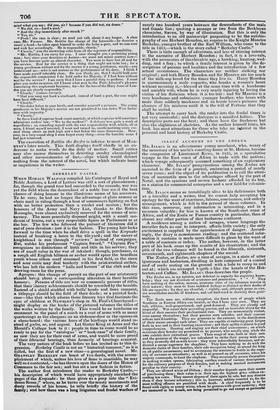BERKELEY CASTLE.
WHEN HORACE WALPOLE compiled his Catalogue of Royal and Noble Authors, a Lord of Letters was still a sort of phenomenon ; for, though the grand tour hail succeeded to the crusade, war was yet the field where the descendant of a noble line stood the best chance of doing honour to the illustrious name of his ancestors. To be sure, he had no longer the advantage of plate armour or chain mail in riding through a host of commoners fighting on foot with no better protection than a corslet and morion ; but the honours of the Army and Navy List, thanks to the Rotten Boroughs, were almost exclusively reserved for the scions of aris- tocracy. The more peacefully disposed might, with a small mo- dicum of brains, cut a very respectable figure in Parliament or at the bar. The few who followed the pursuit of literature did it out of pure devotion : now it is the fashion. The young heir looks forward to the time when he shall drive a quill in the Keepsake instead of breaking a lance in the tilt-yard; and the career of knighthood is run through " reviews " instead of campaigns. But, unlike his predecessor "Captain Sword," "Captain Pen" recognizes no distinctions of birth and title in his service; they are of small value in the war of inkshed : though, perchance, as a rough old English billman or archer would spare the beardless youth whose silken scarf streamed in his first field, so the stern and sour critic may deal tenderly with the aristocratical author, who has left the modern "halls and bowers" of the club and the drawing-room for the press. Apropos: this change of pursuit on the part of our aristocracy should bring about a corresponding alteration in their heraldic honours. Persons of title arc now so commonly persons of titles, that their literary achievements should be recorded by the heralds. Instead of a shield studded with bulls' heads and lions rampant, a titlepage should be the field of their deeds; or a painted book- case—like that which adorns those literary toys that fascinate the eyes of children at NEWBERY'S shop in St. Paul's Churchyard— might display on the backs of the pictured volumes the titles of the works written by the family. This would be as handsome an ornament to the panel of a coach as a coat of arms with as many quarterings as the chequers on an alehouse-door or the squares on a chess-board: the various hues of the bindings would stand in- stead of gales, or, and argent. Let Garter King at Arms and the Herald's College look to it : people in time to come would be as ready to pay for the "catalogue" or " book-case" of their family, as now they are for their coat of' arms, and would be more proud of their librarial bearings, than formerly of bearings armorial. The very nature of the book before us has invited us to this di- gression. Berkeley Castle is not an " historical romance," as it is called, but the first of a new class—a genealogical novel. Mr. GRANTLEY BERKELEY can boast of two deeds, with the accom- plishment of which, unless his love of fame is insatiable, he may well rest contented,—be has thrown open the doors of the House of Commons to the fair sex; and has set a new fashion in fiction.
The author first introduces the reader to Berkeley Castle,— his description of which would have appropriately enriched the pages of the Keepsake: be then gives us a peep into the " Evi- dence Room ;" where, as he turns over the musty muniments and dusty records of his house, he tells briefly the history of the family; and how there was a long litigation and feudal warfare of
nearly two hundred years between the descendants of the male and female line ; quoting a passage or two from the Berkleyan chronicler, SMITH, by way of illustration. But this is only the introduction to an old manuscript purporting to be the autobio- graphy of one Herbert Reardon, an esquire to the Knight Maurice Berkeley, younger brother of the Earl William, who came to the title in 1463,—which is the story called " Berkeley Castle."
There is little enough of adventure, and less of stirring interest in the narrative of Herbert Reardon ; in fact, it is a love-tale, with the accessories of the chivalric age, a hawking, hunting, wed- ding, and a fray ; to which a family interest is given by the de- scriptions of persons and localities and the introduction of a few actual occurrences. The characters are neither striking nor original ; and both Harry Reardon and Sir Maurice are too much of the milk-sop breed for the times they live in. Harry Reardon is unconsciously a male coquette, who breaks a woman's heart without meaning it,—blessed at the same time with a handsome and amiable wife, whom he is very nearly injuring by loving the victim of his flirtation when it is too late : and Sir Maurice is a very handsome and submissive younger brother, who bears with more than soldierly meekness and an heroic lover's patience the absence of his mistress until it is the will of Fortune that they shall be united.
The attempt to carry back the reader into the feudal times is not very successful ; and the dialogue is a manifest failure. The descriptive parts are the best ; and these have the freshness but also the slightness of ,sketches. As the author himself hints, his book has most attractions for those who take an interest in the personal and local history of Berkeley Castle.


























 Previous page
Previous page